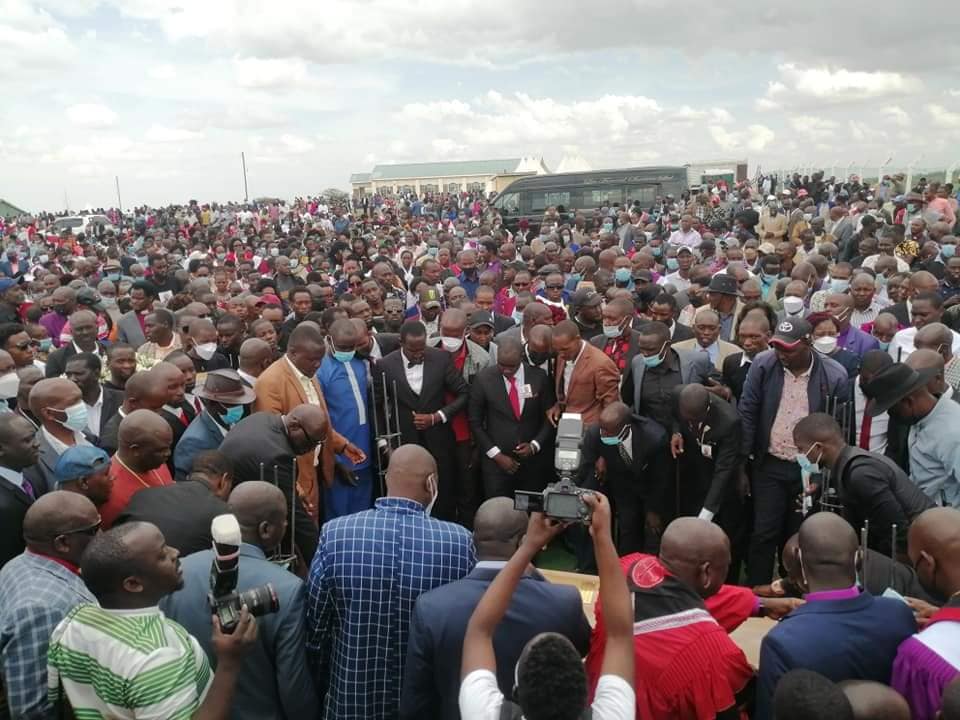Despite his high profile stature, Mzee Kosencha preferred interacting with ordinary mwananchi. “On a number of occasions my father turned down invitations to hold leadership positions, either as a councillor or a chief.”
17 years ago, Mzee Paulo Kosencha gathered his family and told them that when he dies, he would like to be buried inside a church compound.
His wish has been fulfilled as his remains, have today, been interred inside the Olasiti Covenant Church International (CCI) in Keekonyokie area of Kajiado West constituency.
Incidentally, he is the one who donated the five acres, where the church stands. He also funded the construction of the church.
He died on Saturday, January 22, after a long battle with stroke related complications.
Kosencha made a name for himself, for his unmatched passion in preaching the gospel and planting churches throughout Maasai land.
Such was his dedication that when the Bible Society of Kenya unveiled the Bible in Maa language, in 1995, it was Kosencha who received it on behalf of churches in the community.
Back to the family gathering: On that day he told members of his family not to mourn him. “He told us to instead celebrate his life as he would be with the Lord, his Maker,” recalled his son, Noah.
The impressive attendance at his burial is testament to how well-loved and respected Kosencha was in the community.
His evangelical missions took him as far Narok and Tanzania, where he helped set up many churches. The son recalls that in the ’90s, his father used to be in group that held yearly pilgrimages to Tanzania to spread the word of God among the Maasais there. “Their missions would last them up to three months at a time,” he told Kajiado Star. “Every time they went there they were sure to construct a church.”
Kosencha’s passion for planting churches was a marvel for many. “Even where we took our livestock to far places in search of pasture, our father was always keen on his evangelical mission. He always filled the boot of his car with foodstuffs, which he would give his hosts. And as they were holding discussions, he would request them to set aside a small piece of land, where a church would be constructed; undertaking to personally fund the construction,” explains Noah.
Back home, his vast land was always open for neighbours and visitors to graze their livestock. “He even sunk a borehole, where the visitors would water their animals,” said Noah, illustrating his father’s generosity. “As far as I can recall, our home was always filled with visitors, who always felt welcome.”
Despite his high profile stature, Mzee Kosencha preferred interacting with ordinary mwananchi. “On a number of occasions my father turned down invitations to hold leadership positions, either as a councillor or a chief,” added Noah.
Still, despite being a founder member of CCI, Mzee Kosencha eschewed high sounding titles, instead preferring the humble title of evangelist.
While Kosencha was a towering figure in Christian circles, he was even more revered when it came to mediation and peace building. “His services as honest peace broker were widely sought,” explained Noah.
He gave the example of the boundary dispute between the Kangere and Matapato communities that left a number of people dead, in the eighties. “Representatives from both communities suggested that my father lead mediation talks to resolve the conflict. True to type, his peace building efforts brought about peace, which has held to this day,” he explains.
On another occasion, members of his Keekonyokie community got so angry with a man who had fought with their chief, they wanted nothing short of the man being deported back to his Purko kinsmen. “My father successfully mediated between the community and the offending character and he was allowed to continue living among the Keekonyokie,” recalls Noah.
In appreciation, the man offered one of his daughters to be married by one of Kosencha’s many sons.
And speaking of family. Mzee Kosencha was married to four wives. He had 22 sons and 17 daughters. He has left behind 145 grandchildren and 16 great grandchildren.
Noah however clarified that Kosencha converted to Christianity after he had married his wives. He became a Christian in 1980 and was baptised two years later.
Noah explains that their father loved all his children equally. “He was a committed and caring father, who also dotted on his grandchildren. All his children felt his love at a personal level,” he adds.
“The most enduring lesson I learned from him is that nothing is impossible in life, as long as one has strong values. My father was born as an only child and was orphaned at the age of ten; what he has achieved in life is as a result of sheer hard work and determination.”
Mzee Kosencha belonged to the Iseuri age set.
One of his sons, Chris Kosencha, followed in his father’s footsteps and is currently the deputy presiding bishop CCI Kenya.
